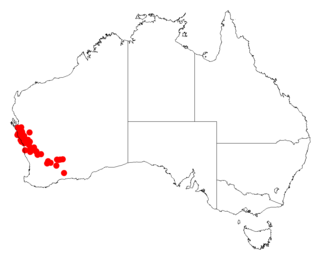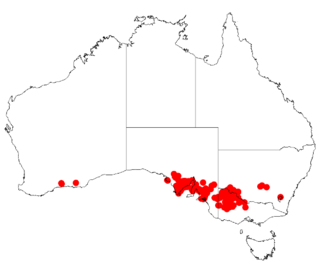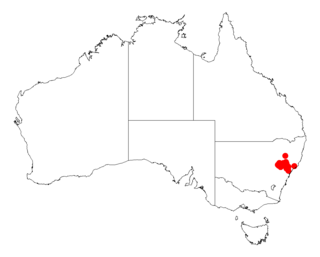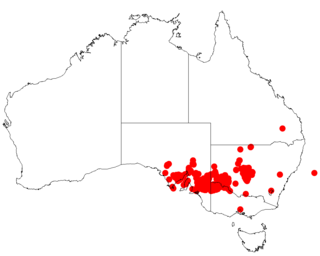
Acacia howittii, commonly known as sticky wattle or Howitt's wattle, is a tree species that is endemic to Victoria, Australia.

Acacia obliquinervia, known colloquially as mountain hickory or mountain hickory wattle, is a species of Acacia that is endemic to south eastern Australia.

Acacia signata is a tree or shrub belonging to the genus Acacia and the subgenus Juliflorae that is endemic to western Australia.

Acacia basedowii, commonly known as Basedow's wattle, is a shrub belonging to the genus Acacia and the subgenus Phyllodineae endemic to arid parts of central Australia.

Acacia clydonophora is a shrub belonging to the genus Acacia and the subgenus Phyllodineae that is endemic to Western Australia.

Acacia falciformis, also commonly known as broad-leaved hickory, hickory wattle, mountain hickory, large-leaf wattle, tanning wattle and black wattle, is a shrub belonging to the genus Acacia and the subgenus Phyllodineae that is endemic to eastern Australia

Acacia halliana is a shrub belonging to the genus Acacia and the subgenus Phyllodineae that is native to parts of south eastern Australia.

Acacia handonis, commonly known as Hando's wattle or Percy Grant wattle, is a shrub belonging to the genus Acacia and the subgenus Phyllodineae that is native to parts of north eastern Australia. In 2008 it was listed as vulnerable according to the Environment Protection and Biodiversity Conservation Act 1999.

Acacia juncifolia, commonly known as rush-leaf wattle, is a shrub or tree belonging to the genus Acacia and the subgenus Phyllodineae that is endemic to north eastern Australia.

Acacia obtusata, commonly known as blunt-leaf wattle or obtuse wattle, is a tree or shrub belonging to the genus Acacia and the subgenus Phyllodineae native to eastern Australia.

Acacia piligera, also known as grub-pod wattle, is a tree or shrub belonging to the genus Acacia and the subgenus Phyllodineae native to eastern Australia.

Acacia wilhelmiana, commonly known as dwarf nealie, Wilhelmi’s wattle and mist wattle, is a shrub belonging to the genus Acacia and the subgenus Plurinerves native to the mallee region of central and eastern Australia.

Acacia gracilifolia, commonly known as graceful wattle, is a shrub belonging to the genus Acacia and the subgenus Plurinerves native to a small area of central southern Australia.

Acacia provincialis, commonly known as swamp wattle or wirilda or water wattle or perennial wattle, is a tree or shrub belonging to the genus Acacia and the subgenus Phyllodineae native to southern and south eastern Australia.

Acacia microcarpa, commonly known as manna wattle, is a shrub belonging to the genus Acacia and the subgenus Phyllodineae endemic to south eastern Australia.

Acacia blakei, commonly known as Blake's wattle or Wollomombi wattle, is a shrub belonging to the genus Acacia and the subgenus Juliflorae that is native to north eastern Australia.

Acacia pycnostachya, also known as Bolivia wattle, is a shrub or tree belonging to the genus Acacia and the subgenus Juliflorae that is native to eastern Australia.

Acacia baeuerlenii is a shrub of the genus Acacia and the subgenus Plurinerves that is endemic to a small area in eastern Australia.

Acacia barattensis, commonly known as Baratta wattle, is a shrub of the genus Acacia and the subgenus Plurinerves that is endemic to a small area in South Australia where the species is considered to be rare.

Acacia elongata, also known as swamp wattle or slender wattle, is a shrub of the genus Acacia and the subgenus Plurinerves that is endemic to coastal areas of eastern Australia.





















